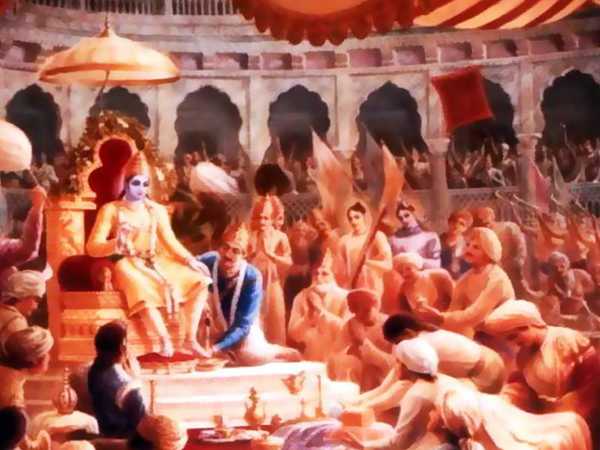Chapter 27

“Vaisampayana said, ‘They passed that night which was characterised byauspicious constellations even thus, O king, in that retreat of righteousascetics. The conversation that occurred was characterised by manyreflections on morality and wealth. Consisting of delightful and sweetwords, it was graced with diverse citations from the Srutis. ThePandavas, O king, leaving costly beds, laid themselves down, near theirmother, on the bare ground. Indeed, those heroes passed that night,having eaten the food which was the food of the high-souled kingDhritarashtra. After the night had passed away, king Yudhishthira, havinggone through his morning acts, proceeded to survey that retreat in thecompany of his brothers. With the ladies of his household the servants,and his priest, the king roved about the retreat in all directions, as hepleased, at the command of Dhritarashtra. He beheld many sacrificialaltars with sacred fires blazing on them and with many ascetics seated onthem, that had performed their oblations and poured libations in honourof the deities. Those altars were overspread with fruits and roots of theforest, and with heaps of flowers. The smoke of clarified butter curledupwards from them. They were graced, besides, with many asceticspossessed of bodies that looked like the embodied Vedas and with manythat belonged to the lay brotherhood. Herds of deer were grazing, orresting here and there, freed from every fear. Innumerable birds alsowere there, engaged in uttering their melodious notes, O king. The wholeforest seemed to resound with the notes of peacocks and Datyuhas andKokilas and the sweet songs of other warblers.[43] Some spots echoed withthe chant of Vedic hymns recited by learned Brahmanas. Some were adornedwith large heaps of fruits and roots gathered from the wilderness. KingYudhishthira then gave those ascetics jars made of gold or copper whichhe had brought for them, and many deer-skins and blankets and sacrificialladles made of wood, and Kamandalus and wooden platters, and pots andpans, O Bharata.[44] Diverse kinds of vessels, made of iron, and smallervessels and cups of various sizes, were also given away by the king, theascetics taking them away, each as many as he liked. King Yudhishthira ofrighteous soul, having thus roved through the woods and beheld thediverse retreats of ascetics and made many gifts, returned to the placewhere his uncle was. He saw king Dhritarashtra, that lord of Earth, athis ease, with Gandhari beside him, after having finished his morningrites. The righteous-souled monarch saw also his mother, Kunti, seatednot much remote from that place, like a disciple with bent head, enduedwith humility. He saluted the old king, proclaiming his name. ‘Sit down’were the words the old king said. Receiving Dhritarashtra’s permission,Yudhishthira sat himself down on a mat of Kusa grass. Then the other sonsof Pandu with Bhima among them, O thou of Bharata’s race, saluted theking and touched his feet and sat themselves down, receiving hispermission. The old Kuru king, surrounded by them, looked exceedinglybeautiful. Indeed, he blazed with a Vedic splendour like Vrihaspati inthe midst of the celestials. After they had sat themselves down, manygreat Rishis, viz., Satayupa and others, who were denizens ofKurukshetra, came there. The illustrious and learned Vyasa, possessed ofgreat energy, and reverenced by even the celestial Rishis, showedhimself, at the head of his numerous disciples, unto Yudhishthira. TheKuru king Dhritarashtra, Kunti’s son Yudhishthira of great energy, andBhimasena and others, stood up and advancing a few steps, saluted thoseguests. Approaching near, Vyasa, surrounded by Satayupa and others,addressed king Dhritarashtra, saying,–‘Be thou seated.’ The illustriousVyasa then took an excellent seat made of Kusa grass placed upon a blackdeer-skin and covered with a piece of silken cloth. They had reservedthat seat for him. After Vyasa had been seated, all those foremost ofregenerate persons, endued with abundant energy, sat themselves down,having received the permission of the Island-born sage.”




